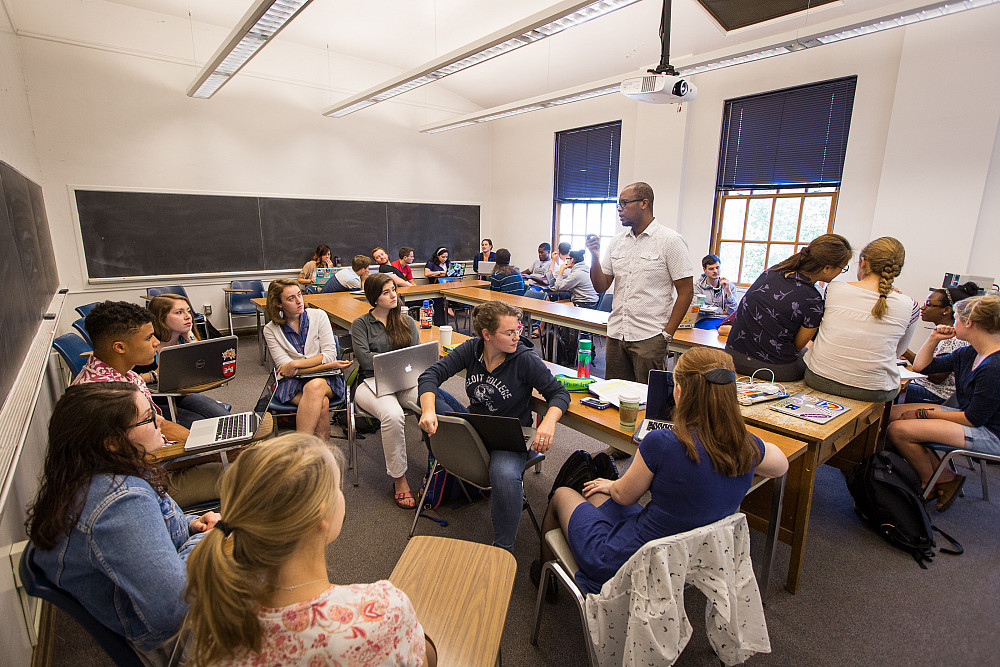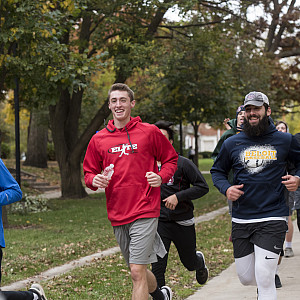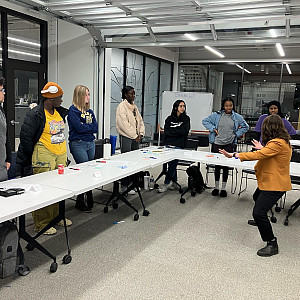Ron Watson Receives the Underkofler Teaching Award
The student body nominated political science professor, health and society mentor, and community advocate Ron Watson for Beloit College’s highest teaching honor, the Underkofler Teaching Award.
Watson engages his students in real-world problems, encourages them to think deeply about their passions, and gives them his undivided attention in and out of the classroom.

“I’m honored to be selected for the Underkofler Teaching Award,” Professor Ron Watson says. “I thank my students and colleagues for making this possible. Beloit College students are capable of deep engagement with their studies; that is very motivating for me.
“I’ve also benefited enormously from the Beloit faculty who have mentored and encouraged me, particularly those in my home department, political science, and in the health and society program. My colleagues have been nothing but collegial and supportive. From the very beginning of my arrival at Beloit College in 2013, they encouraged me to be creative.”
Indeed, Professor Pablo Toral, who chairs the department of political science, notes that “Ron has shown leadership and creativity in his teaching and mentoring of students, while also being an active citizen in the city of Beloit.”
Among other roles, Watson has served as the chair of the Beloit Police and Fire Commission and facilitated candidate forums. “The city of Beloit has been welcoming to me,” he says. “It is a microcosm of American possibility, and Beloit residents take enormous pride in their diverse city.” Watson’s engagement with the city of Beloit has helped both the research he’s undertaken with students in Beloit and his advising of the Beloit Public Health Initiative, a student-led, legally registered community public health nonprofit. He is also sought after in the city of Beloit for his expertise in health disparities.
Watson is patient with students learning material for the first time and provides individualized attention, an approach he learned while teaching English as a Second Language in Japan for five years. In their nominations, students wrote that he not only cares about his students’ success and makes them feel valued, but also offers extra help when a student needs it, all while taking a “no-nonsense” approach to his classes. His transformative teaching and leadership have also invigorated the health and society program, according to Psychology Professor Suzanne Cox.
Still, when Watson began graduate studies in political science at the University of New Mexico with a focus on public health, he didn’t think a teaching career was on the horizon. That changed when Deborah McFarlane, his mentor at UNM and a professor of political science and public policy, asked him to substitute for her in one of her classes. Not only did he enjoy the experience, but so did the students, who asked McFarlane when he’d be back.

Ultimately, however, while he is passionate about his subject matter, his larger goals are to teach students to think critically and to identify their passions, so they can successfully navigate their lives and careers after graduation, no matter the setting or the nature of their first job. In any given situation, he hopes Beloit graduates will be able to ask themselves both how they can contribute and which lessons they can take away for their futures. Alumni corroborate the success of his approach.
Watson himself now has the opportunity to apply what he has learned from his teaching and mentoring and his engagement with the city of Beloit to a new role. In July, he becomes co-director of the college’s Career Channels program.
“I’m excited to take on this role,” he says. “In my view, college is the best way to support both individual and societal growth and advancement, and the Channels program offers the Beloit College community a compelling way to think about careers and career development. It allows alumni to both stay connected to the college and invest in Beloit College students’ future success.”
Now that the Channels program has been running for a few years, Watson hopes to extend the program to high school students, so that even before they enter Beloit College, they can begin imagining how their undergraduate studies will connect to potential careers.


